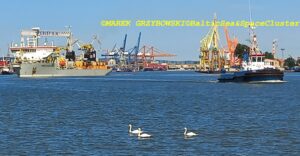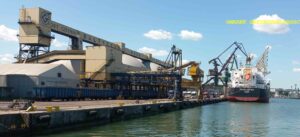By Marek Grzybowski
An ESG guidance for shipping was published this summer,. The implementation of an ESG strategy in shipping has implications throughout the ship supply and operation chain, from design through manufacturing, operation and port service.
The guide, developed jointly by Mærsk Mc-Kinney Møller Center for Zero Carbon Shipping experts together with Boston Consulting Group analysts, is intended to help companies operating in maritime transport implement comprehensive ESG (Environmental, Social and Governance) strategies. The essence of ESG was explained during a special webinar by Tanja Dalgaard, Chief Strategy & Operations Officer, Anne Katrine Bjerregaard Head of Strategy & Sustainability Office, Mikkel Krogsgaard Managing Director & Partner, BCG Peter Jameson Partner, BCG.
– In the world of maritime business, as in other industries, ESG reporting covers topics such as recycling, greenhouse gas emissions, other types of air pollution, environmental impact, business ethics, employee health and safety, as well as safety management and prevention accidents, explain DNV experts.
Remi Eriksen, Group President and CEO, DNV and Knut Ørbeck-Nilssen, CEO of DNV GL, pointed out the need for a comprehensive approach to the implementation of the ESG strategy during the presentation of the “Energy Transition Outlook 2023” and “Maritime safety trends” reports during Nor Shipping 2023.
ESG sets standards
According to DNV, ESG reports and sustainability reports are intended to reveal the achievement of parameters in all three areas that are important for the functioning of a modern company. Reporting these parameters is intended to meet the expectations of stakeholders cooperating with the partner.
It’s about being transparent in assessing corporate responsibility. The report makes it possible to publish information that a business partner has rules, initiatives and strategies for managing under risk conditions and the ability to take advantage of the opportunities offered by management that takes into account ESG requirements.
In maritime industries, reports are published by leading companies operating both in the shipbuilding industry and maritime transport, in ports and offshore, in fishing and tourism, as well as companies operating in the vicinity of these industries.
ESG in ports
“Cargo operators recognize the role of ports [in implementing the ESG strategy] and will favor those who act according to the requirements,” noted Mark Nailer, head of the maritime division at Midstream in an article for Hellenic’s “Shipping News Worldwide”. In his opinion, “the adverse impact of the global port and terminal sector on [substances and CO2 – MG] emissions and local communities is significant.
Emissions and air pollution account for a large part of this impact, while the safety of workers [ports – MG] is another major concern. It is estimated that reducing port emissions could directly improve the health of more than 3.5 billion people by reducing air and water pollution – and indirectly improve health and well-being by helping to mitigate climate change, Nailer points to the UNCTAD report.
ESG in the shipbuilding industry
In many cases, it has already been said that shipyards should be hybrid, i.e. ensuring production and repairs taking into account environmental, social and ethical requirements.
One of the leading shipyards in implementing ESG is the Hyundai Heavy Industries Group (HHI). Already at the beginning of 2021, it adopted an ESG strategy. Within the five companies operating in the HHI Group, committees have been established for environmental protection, shaping social responsibility and implementing ethical management practices. The five participating companies are: Hyundai Mipo Dockyard Co., Hyundai Construction Equipment Co., Hyundai Electric Energy Systems Co., Hyundai Heavy Industries Co. and Hyundai Samho Heavy Industries Co.
Why (not only) Shipping Companies Don’t Have an ESG Plan
Increasingly, however, many shippers and logistics companies, as well as final recipients, demand information about the comprehensive carbon footprint related to the transport of goods between ports, and often from the producer to the consumer. High demands are placed on sea tourism and ferry operators. This is increasingly required of fish and seafood producers and processors as well as logisticians operating in this industry.
Offshore oil and gas operators and wind farm builders pay attention to sustainable development. It can be expected that the ESG strategy will soon become the flagship of every company that intends to operate in the maritime industry. On the other hand, the ESG standard will determine the level of involvement of shipowners and ports, offshore operators and fish producers in the sustainable development of our globe.

